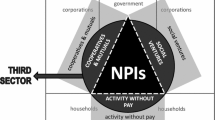Abstract
This paper takes an initial step toward a better understanding of the complex set of pressing problems that need to be addressed by the Eastern European nonprofit sectors and their supporters in the near future. It gives an overview of the main challenges and claims that different nonprofit sectors of the region are at different crossroads. It identifies a general policy crisis that is fueled by the lack of a comprehensive knowledge of the sector and clear political intentions of cooperating with it. In addition, the dependence on foreign funding may result in a sustainability crisis in several Eastern European countries. In the most developed part of the region, the main elements of the present crisis are the fiscal, economic, effectiveness, identity, and legitimacy problems, which have something in common with the challenges facing the much more mature nonprofit sectors of the developed world.
Similar content being viewed by others
REFERENCES
Abzug, R., and Webb, N. J. (1996). Another role for nonprofits: The case of mop-ups and nursemaids resulting from privatization in emerging economies. Nonprofit and Voluntary Sector Quarterly, 2, 156-173.
Anheier, H. K., and Seibel, W. (1998). The nonprofit sector and the transformation of societies: A comparative analysis of East Germany, Poland, and Hungary. In W. W. Powell, and E. S. Clemens (eds.), Private Action and the Public Good, Yale University Press, New Haven, Connecticut, and London.
Bocz, J., Emri, I., Kuti, É., Mészáros, G., and Sevestény, I. (1998). Nonprofit szervezetek Magyarországon, 1996 (Nonprofit Organizations in Hungary, 1996), Központi Statisztikai Hivatal, Budapest.
CIVICUS (1997). The New Civic Atlas. Profiles of Civil Society in 60 Countries, Washington, D.C.
Comment on Stephen M. Wunker, “The promise of non-profits in Poland and Hungary: An analysis of third sector renaissance” (1992). Voluntas, 1, 89-98.
Coury, J. M., and Lucanin, J. D. (1996). Mending the social safety net after state socialism: “Dobrobit”—One nongovernmental organization in Zagreb, Croatia. Nonprofit and Voluntary Sector Quarterly, 3, 283-301.
Cornell Gorka, K. (1996). U.S. support for nongovernmental organizations. In M. Lazar (ed.), Fortifying the Foundations. U.S. Support for Developing and Strengthening Democracy in East Central Europe, Institute of International Education, New York.
Fowler, A. (1995). Strengthening the Role of Voluntary Development Organizations: Policy Issues Facing Official AID Agencies, Overseas Development Council, Washington, D.C.
Gassler, R. S. (1991). Non-profit enterprise and Soviet economic reform. Voluntas, 1, 95-109.
Horváth, I., and Deák Sala, Z. (1995). A romániai magyar egyesületek és alapítványok szociológiai leírása (A sociological overview of the Hungarian voluntary associations and foundations in Romania). Korunk, 11, 23-57.
Hyatt, J. (1998). From Transition to Development: The Non-Profit Sectors of Central and Eastern Europe, Charities Evaluation Services, London.
Jenkins, R. M. (1995). Politics and the development of the Hungarian non-profit sector. Voluntas, 2, 183-201.
Kramer, R. M. (1992). The roles of voluntary social service organizations in four European states: Policies and trends in England, The Netherlands, Italy, and Norway, In S. Kuhnle and P. Selle (eds.), Government and Voluntary Organizations. A Relational Perspective, Avebury, Aldershot, Brookfield, USA, Hong Kong, Singapore, and Sydney.
Kuti, É. (1996). The Nonprofit Sector in Hungary, Manchester University Press, Manchester.
Lazar, M. (ed.) (1996). Fortifying the Foundations. U.S. Support for Developing and Strengthening Democracy in East Central Europe, Institute of International Education, New York.
Les, E. (1994). The Voluntary Sector in Post-Communist East Central Europe, CIVICUS, Washington, D.C.
Les, E. (1997). The role of nongovernmental organizations in service delivery for the elderly in Poland. In V. Gáthy and M. Yamaji (eds.), A New Dialogue Between Central Europe and Japan, Institute for Social Conflict Research, Budapest, and International Research Center for Japanese Studies, Kyoto.
McCarthy, K. D. (1995). From government to grass-roots reform: The Ford Foundation's population programmes in South Asia, 1959–1981. Voluntas, 3, 292-316.
Ners, K. J., Palmer, M., and Fyfe, A. (1998). Assistance—To Accession and Beyond, Policy Education Centre on Assistance to Transition, Warsaw.
Quigley, K. F. F. (1997). For Democracy's Sake. Foundations and Democracy Assistance in Central Europe, Woodrow Wilson Center Press, Washington, D.C.
Regulska, J. (1998). Building local democracy: The role of the Western assistance in Poland. Voluntas, 1, 39-57.
Salamon, L. M. (1997). Holding the Center. America's Nonprofit Sector at a Crossroads, Nathan Cummings Foundation, New York.
Siegel, D., and Yancey, J. (1993). The Rebirth of Civil Society: The Development of the Nonprofit Sector in East Central Europe and the Role of Western Assistance, Rockefeller Brothers Fund, New York.
Vajda, Á. (1997). Citizens' initiatives in a middle-size Hungarian town. In V. Gáthy, and M. Yamaji (eds.), A New Dialogue Between Central Europe and Japan, Institute for Social Conflict Research, Budapest, and International Research Center for Japanese Studies, Kyoto.
Wallerstein, I. (1983). A modern világgazdasági rendszer kialakulása. In A tökés mezögazdaság és az európai világgazdaság eredete a XVI. században (Evolution of the Modern World-System. Capitalist Agriculture and the Origins of the European World Eeconomy in the Sixteenth Century), Gondolat, Budapest.
Wunker, S. M. (1991). The promise of non-profits in Poland and Hungary: An analysis of third sector renaissance. Voluntas, 2, 89-107.
Author information
Authors and Affiliations
Rights and permissions
About this article
Cite this article
Kuti, É. Different Eastern European Countries at Different Crossroads. VOLUNTAS: International Journal of Voluntary and Nonprofit Organizations 10, 51–60 (1999). https://doi.org/10.1023/A:1021491720489
Issue Date:
DOI: https://doi.org/10.1023/A:1021491720489




